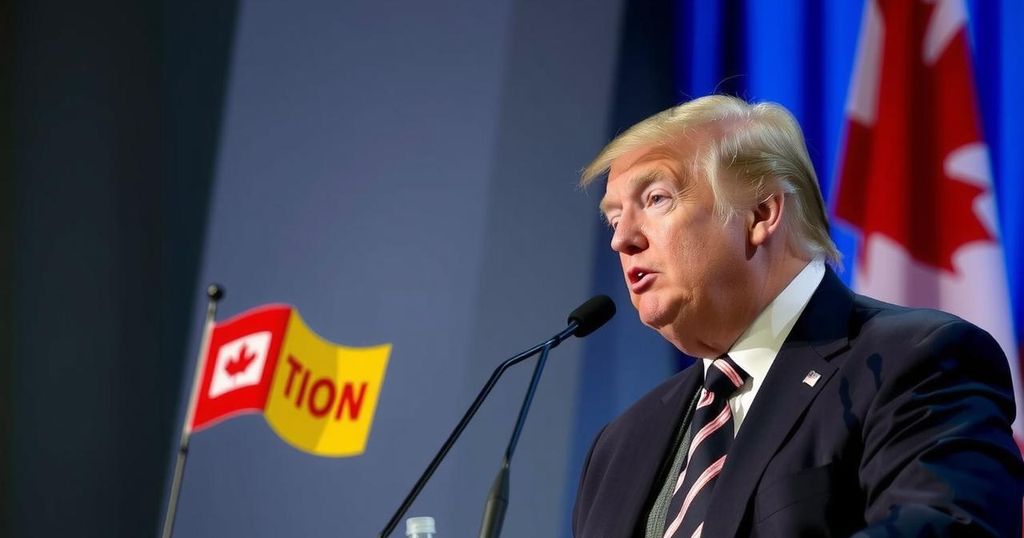Trump’s Proposed Tariff on Canadian Imports Sparks Outcry and Concerns

President-elect Donald Trump’s proposed 25% tariff on imports from Canada has sparked significant backlash, particularly from Ontario Premier Doug Ford, who deems it “devastating”. Canadian officials stress the importance of trade relations with the U.S., while industry leaders suggest these tariffs could be part of negotiation strategies. Meanwhile, illegal border crossings remain a concern, highlighting the complexity of U.S.-Canada interactions in the context of trade and security.
The proposed implementation of a 25% tariff on imports from Canada and other key trading partners by President-elect Donald Trump has ignited considerable concern within Canada. Doug Ford, the Ontario Premier, described the tariff as “devastating” for both Canadian and American workers. This plan forms part of Trump’s broader strategy to combat illegal immigration and drug trafficking.
Canadian officials, including Prime Minister Justin Trudeau, have responded with an emphasis on the importance of maintaining robust trading relations, given that Canada accounted for $437 billion in U.S. imports in 2022. Trudeau has engaged in discussions with Trump and provincial leaders, reflecting a mutual resolution to prioritize trade relations amid potential tariffs. Trudeau’s administration underscored the necessity of collaboration at their shared border, which plays a crucial role in both nations’ economies.
The proposed tariffs are anticipated to take effect shortly after Trump’s inauguration on January 20, 2025. The leaders of various Canadian provinces, such as Quebec and British Columbia, expressed solidarity with Ontario’s criticism, with calls for an urgent meeting amongst provincial leaders to address the border situation.
Furthermore, despite the fears surrounding Trump’s tariff agenda, some industry leaders remain optimistic, suggesting that these tariff proposals may serve as negotiation tactics. Scott Bessent, a nominee for the U.S. Treasury secretary, indicated that Trump is ultimately a proponent of free trade, implying that escalated rhetoric may lead to eventual de-escalation. Meanwhile, concerns regarding illegal border crossings have been heightened, with officials noting a dramatic increase in arrests over the past year, raising questions about border security and regulatory measures.
The reaction to President-elect Trump’s tariff proposal is a critical aspect of the ongoing U.S.-Canada trade relationship. The potential tariffs present a significant challenge, particularly for Canada, which is a major trading partner of the United States. The tariffs are positioned as tools to address illegal immigration and drug trafficking, issues that have garnered considerable attention in U.S. policy discussions. Understanding this context is vital to comprehend both the economic implications and the political negotiations surrounding the situation.
In summary, the proposed tariffs by President Trump have elicited strong reactions from Canadian officials, particularly regarding the potential negative impact on trade and employment. The discussions between Prime Minister Trudeau and U.S. officials underscore the importance of maintaining a cooperative trade relationship. While the concerns over illegal crossings and drug smuggling remain pressing, some industry leaders are hopeful that these tariff threats may evolve into more constructive negotiations as the situation unfolds.
Original Source: www.bbc.com





